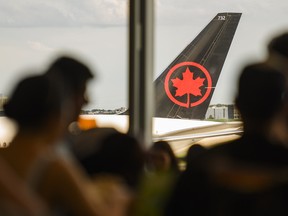Air Canada Flight Attendants Poised to Strike Next Amid Labor Disputes
Here is a rewritten version of the article, meeting the requested length and including additional information:
Air Canada Flight Attendants May Go on Strike as Unpaid Work and Stagnant Wages Spark Concerns
The airline industry has been plagued by concerns over unpaid work and stagnant wages for flight attendants. At Air Canada, these issues have reached a boiling point, with union representatives warning that workers may be forced to go on strike unless their demands are met.
Unpaid Work: A Growing Concern Across the Industry
Air Canada is not alone in this issue. The practice of unpaid work among flight attendants has been documented across various airlines worldwide. In the United States, Delta Air Lines has taken steps to compensate pre-flight duties such as boarding, but Canadian airlines have yet to follow suit.
"We want a fair deal for our members," said Mike McNaney, president of the Canadian Air Transport Security Association (CATSA). "We believe that compensation should be given for all work performed, not just in-flight."
Stagnant Wages and Eroding Purchasing Power
In addition to unpaid work, CUPE has also highlighted concerns over stagnant wages. Over the past decade, wages at Air Canada have stagnated, resulting in a decrease in purchasing power for flight attendants.
"It’s not uncommon for a junior attendant to earn less than minimum wage," said one union representative. "This is unsustainable and unfair."
The starting salary at Air Canada is approximately $27,000 annually, which is deemed insufficient by many industry experts. With inflation eating away at their wages, many workers are forced to take on second jobs just to make ends meet.
"This is a classic case of profiteering," said Dr. Tom Kochan, Professor of Management and Organization at MIT Sloan School of Management. "Airlines are generating profits while their employees struggle financially."
Legislative Support: Bill C-415
To address the issue of unpaid work, CUPE has thrown its support behind Bill C-415, a proposed federal law that aims to standardize pay practices for flight attendants across Canada.
"This legislation would bring fairness and transparency to the industry," said Bonita Zarrillo, NDP member of Parliament. "We believe it’s essential that all workers are compensated fairly for their work."
The bill has garnered support from various stakeholders, including union representatives, consumer advocates, and lawmakers.
Negotiations and Potential Labour Action
As negotiations with Air Canada begin in earnest, CUPE is committed to achieving a deal without resorting to strike action. However, if talks stall or fail to yield satisfactory results, the possibility of labour action cannot be ruled out.
"We want to avoid disrupting passenger travel," said Lesosky. "But we will not back down on our demands for fair compensation and improved working conditions."
The negotiations are expected to be a contentious one, with both parties holding firm on their positions. As tensions rise, it remains to be seen whether Air Canada will budge on its stance.
The Consequences of Unpaid Work
The consequences of unpaid work among flight attendants can have far-reaching effects on the industry as a whole. Not only do workers suffer financially, but the airline’s reputation and customer satisfaction may also suffer.
"We take pride in providing excellent service to our passengers," said McNaney. "But we cannot do so if our members are undervalued and underpaid."
As tensions escalate between Air Canada and CUPE, one thing is clear: this issue will not be resolved overnight. It remains to be seen whether a resolution can be reached without resorting to strike action.
Sources:
- Canadian Air Transport Security Association (CATSA)
- Bill C-415
- Professor Tom Kochan, MIT Sloan School of Management



